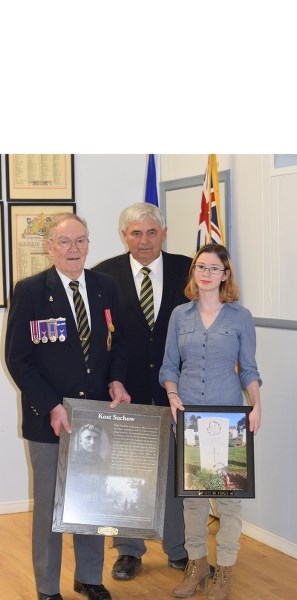A Bloomsbury resident who served with the Calgary Highlanders as part of Canadian D-Day force returned home, at least in part, due to the efforts of a Cherhill teen.
Last week, Beth McDonald and a small contingent from the Cherhill Royal Canadian Legion presented the Barrhead Legion with an informational plaque and picture commemorating Pte. Kost Suchow, who was killed in action July 12, 1944 six days after landing on the beach in Normandy, and is buried in the Beny-Sur-Mer Canadian War Cemetery in France.
About a month ago, Beth McDonald, Grade 12, was visiting the cemetery as part of a 10-student Mayerthorpe High School contingent that visited France, the Netherlands and Germany as part of a two week Education First tour to mark the 100th anniversary of Vimy Ridge.
As part of the tour they visited Juno Beach, Beaumont-Hamel and Beny-Sur-Mer.
“When we were there [Beny-Sur-Mer], I was just looking at the graves, not looking for any specific one, readings some of the names, their service numbers and some of the symbols on the tombstones,” she said, adding when she was looking at one of the graves, something caught her eyes. It said ‘one of the boys from Barrhead’.
“I said I know where Barrhead is, so I took a picture, thinking someone back home might want to see it,” McDonald said.
She then e-mailed the picture to her mother, Lorraine, who, with Beth’s permission got the picture enlarged and asked the Cherhill Legion if they would make an official presentation to the Barrhead branch.
Something they were all too happy to do.
“At first I was leery about sending Beth overseas, but when I saw all the First and Second World War sites on the tour and all the educational opportunities, we knew she had to go,” Lorraine said.
McDonald added that the Cherhill Legion also donated two Canadian Maple leafs that she left at the Juno Bean and Beaumont-Hamel memorials.
“So there is a little bit of Alberta left there,” she said.
Herman Barkemeyer, Barrhead Legion member and Korean War veteran, asked McDonald what she thought about as she visited all the different Canadian cemeteries.
“There were just so many thoughts that kept going through my head,” she said, adding while she had been to cemeteries before she had never been to ones involving war. “It is a big difference. The thing I think that I noticed first and had the most impact is their ages. Most of them were about my age and it just made everything real. It just wasn’t something that happened a long time ago to other people. They had so much more of their lives to live.”
Barkemeyer agreed, saying that is the comment he has heard most from those who have visited a Canadian War cemetery.
“We are so lucky to have countries that look after the cemeteries so well. France, Holland and Korea are especially good,” he said, adding not every country is so generous.
For example, he said, there are allied soldiers buried in cemeteries in Germany.
“And now they want their land back,” Barkemeyer said.



